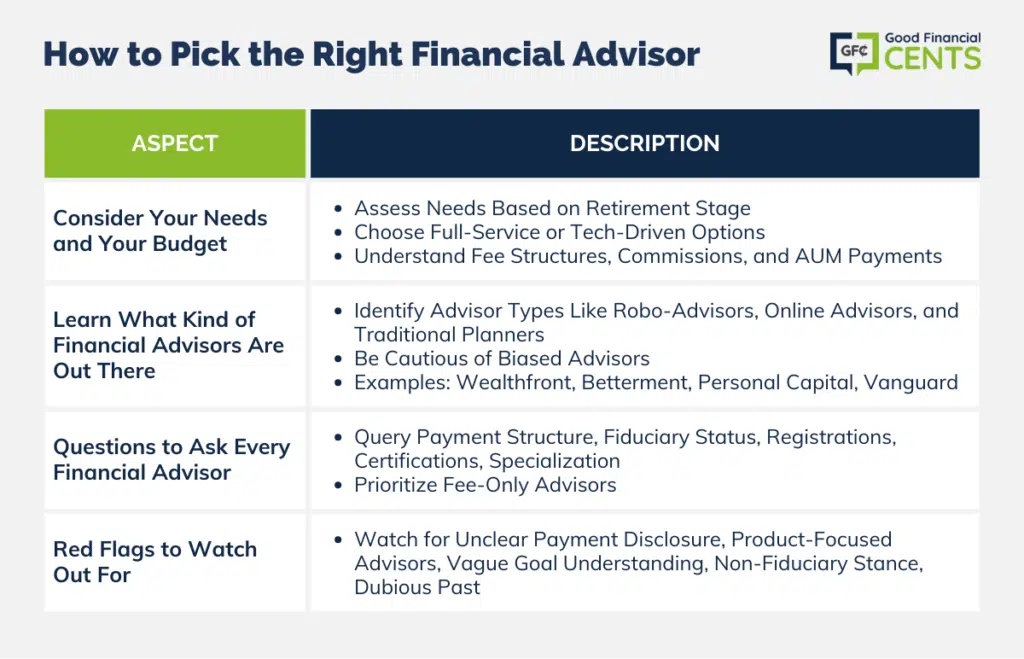New technology has made it possible for almost anyone to manage their own investment accounts, yet not everyone has the time to devote to the process. Plus, if you manage your investments in a less-than-optimal way, you could wind up with lower returns than you would have otherwise.
These are just a few reasons many people opt to work with a financial advisor. Professionals who work in this niche are trained to help you invest in a way that has the potential to increase returns with the right amount of risk for you.
Table of Contents
The problem with financial advisors is that there are so many and that financial planners have gotten a bad rap for putting their own interests ahead of those of their clients. Fortunately, you can find an advisor who will put your needs first — if you know what to look for.
Statistics even show that hiring professional help could leave you better off. According to the Vanguard Advisor’s Alpha study, clients who work with highly trained financial advisors could see more value in their portfolios.
The decision to work with a financial advisor is a personal one, but it’s also one where so much is at stake. Use the tool below to get matched with a financial advisor who can help you grow wealth and avoid common investing mistakes:
Consider Your Needs and Your Budget
Define Your Unique Needs
When searching for a financial advisor, you’ll want to start by assessing your own needs. This can depend a lot on where you are in your retirement planning journey — whether you’re first building wealth or whether you’re nearing retirement and hoping to make the right last-minute moves.
Consider whether you want full-service financial planning services and ongoing access to a professional who is available to answer your questions and help you plan your future. Maybe you don’t need quite as much hand-holding, in which case you could wind up paying less overall if you signed up for an online financial planning platform that uses technology to manage your portfolio and optimize returns.
Understand the Pay Structure
Whatever you do, make sure you understand that you’re going to pay for this type of help. Many financial advisors charge a flat fee of 1% of your portfolio or more each year in exchange for managing your money. Some also earn commissions for investments they sell you, and they may even choose investments that are loaded with fees that eat away at the amount of money that is actually invested on your behalf.
Online financial planning services tend to cost less overall, but you should still expect to pay anywhere from .25% to .80% of your portfolio in fees each year. As you look for a financial advisor, you’ll want to figure out how advisors you’re considering get paid, and whether they earn commission on the investments they sell you.
The most common ways financial advisors get paid is referred to as AUM, or “assets under management.” With this payment structure, your financial advisor would deduct their management fee from your investment accounts, versus having you pay their fee out of your pocket. This may sound convenient, but it also means you may not realize how much you’re paying in account management fees over the months and years you pay for professional advice.
Learn What Kind of Financial Advisors Are Out There
The term financial advisor can apply to a wide range of professionals, but keep in mind that many people who shouldn’t use this title do so anyway. As an example, you’ll likely come across “financial representatives” who focus most of their work on selling whole life insurance. You’ll also run into financial advisors who use high-pressure sales tactics to sell overpriced, underperforming annuities and other investments that boost their bottom line at your expense.
Before you pick a financial advisor, you should know about the types of advisors that exist.
Robo-Advisors
Robo-advisors use technology and algorithms to invest your money in a way that aligns with your appetite for risk. Firms you may have heard of in this niche include Wealthfront, but there are plenty of others.
Robo-advisors tend to charge a percentage of your portfolio amount each year while investing your money in a way that achieves optimal returns while keeping taxes at a minimum. With Betterment, for example, you’ll pay .25% to .40% of your portfolio amount each year you use this service.
Online Financial Advisors
Online financial advisors can come in a few different forms. For starters, there are financial advisors who only see clients online and may be willing to charge lower rates or one-time flat fees in exchange for investment advice.
In other scenarios, an online financial advisor can also be a robo-advisor that lets you connect with an individual financial planner they assign to your case. Fees tend to be higher when you want professional advice on top of technology-based investment planning, but online financial advisors can be a good alternative if you want some personalized planning but you don’t need a full-service financial advisor.
A good example in this niche is Personal Capital. With this firm, clients with at least $200,000 in assets can opt for a Wealth Management plan (or a Private Client plan with assets over $1 million) and have access to two dedicated financial advisors who can provide personalized advice.
Vanguard is another investment firm that has a financial advice offering through its Vanguard Personal Advisor Services®. Vanguard financial advisors are paid a salary, so they do not benefit from the investments they select. The annual cost for this service is also just .30%, which is considerably less than the industry average of 1.01%.
Traditional Financial Planners
Next up, you’ll find traditional financial advisors most people think of, which may call themselves wealth planners or investment advisors. Also note that some financial advisors go the extra mile to earn the Certified Financial Planner (CFP) designation, which is awarded by the Certified Financial Planner Board of Standards when an advisor completes the CFP exam and keeps up with ongoing education in order to stay on top of their industry.
Traditional financial planners typically get paid in one of three ways:
- Financial planners are often fee-based, which could mean they are paid using AUM, or with a flat fee for their services
- Some financial advisors are commission-based, meaning they make money when they sell you investments
- Others earn a fee for their services and commission on the investment products they sell
This is where things get tricky and part of the reason traditional financial advisors have gotten a bad rap. In some cases, advisors who earn a commission have been known to move their clients into complicated, expensive investments that also pay huge commissions to the investment “salesperson.”
For this reason, it’s smart to know how your investment professional gets paid and to opt for an advisor who gets paid with a flat fee or using AUM. This payment structure allows them to give you the best advice for your situation without having to worry about commissions. An AUM structure in particular also rewards your financial advisor for growing your portfolio balance over time, which is the whole reason you hired them in the first place.
Questions to Ask Every Financial Advisor
If you plan to go with a robo-advisor, then you can find all the information you need by researching all the top robo-advisors and what they have to offer. But if you plan to hire a financial professional to work with you on a one-on-one basis, you need to make sure you’re asking the right questions.
Here’s everything you need to ask every financial advisor you’re considering:
- How Do You Get Paid? You should know how your financial professional gets paid as well as whether they earn commissions on the investments they sell. If you want to work with a financial advisor who does not earn commissions, then you’ll want to seek out a fee-only financial advisor.
- Are You a Fiduciary? A financial advisor who is a fiduciary is legally required to put your interests first as they craft your financial plan. You should find out if each financial advisor you interview is a fiduciary and stay away from ones that are not or refuse to answer the question.
- Are you a Registered Investment Advisor (RIA) or an Investment Advisor Representative (IAR)? These are the two main registrations that permit financial professionals to provide financial advice in exchange for compensation. Anyone who does not hold one of these registrations shouldn’t be offering financial advice, so make sure to ask.
- Do You Hold Any Certifications? Does your advisor hold a CFP designation or have another professional certification like a Certified Public Accountant (CPA)? Professional certifications can show that a financial advisor has gone the extra mile to stay educated and informed in their area of expertise.
- What Services Do You Offer? Some financial planners focus on retirement planning, while others may have expertise in working with high-net-worth individuals or minimizing taxes. Make sure you know exactly what each financial advisor is offering in terms of account management and advice, and look for a professional who specializes in working with people just like you.
Red Flags to Watch Out For
When hiring a financial advisor, it’s crucial to make sure you’re asking all the right questions. At the same time, there are some pretty obvious red flags you should look for along the way. These can include:
- Financial advisors who won’t tell you exactly how they get paid
- Professionals who work for companies that focus on specific products like whole life insurance or annuities
- Any time a financial advisor starts suggesting products without knowing your full financial situation
- Advisors who don’t take the time to ask you about your goals
- Financial planners who do not act as a fiduciary
- Financial advisors who have a shady or questionable past, which you can find out by using BrokerCheck by FINRA
At the end of the day, any financial advisor you place your trust in should be someone who is completely open and honest about the way they work and how they get paid. If you’re worried about using a financial planner who earns big commissions for products they sell, seek out fee-only financial advisors who are paid a flat percentage or rate no matter which investments they suggest.

Frequently Asked Questions (FAQs)
The following questions and answers can aid in your quest to find the right financial advisor.
A financial fiduciary is a professional who is legally required to put their client’s interest first. If they do not act in their client’s best interests, they could be held legally liable.
Choosing a financial advisor who is a fiduciary is crucial if you want quality, expert advice that is suitable for your situation.
The BrokerCheck tool from FINRA lets you research the background and experience of financial brokers and specific firms. This tool is free to use.
Financial advisors may be paid in different ways. Some fee-only financial advisors are paid a flat fee or as a percentage of your investments (known as AUM), while others are paid commissions on the investments they sell. Some financial advisors may also be paid fees and commissions, so make sure to ask.
Robo-advisors are technology-based companies that manage your money and help you plan your investments for a lower cost than traditional financial advisors.
The Bottom Line
Finding the right financial advisor for your needs is an important task. After all, the advice this professional offers could mean the difference between never reaching your goals or retiring wealthy and on time.
There’s no “right” or “wrong” way to choose a financial planner to manage your wealth, but there are plenty of questions to ask and red flags to watch out for. Whatever you do, don’t work with the first financial planner you come across without asking how they get paid and checking into their background. The best financial advisors have nothing to hide, but you shouldn’t take their word for it.
Disclosure: All investing is subject to risk, including the possible loss of the money you invest.
Advice services are provided by Vanguard Advice Services, a registered investment advisor, or by Vanguard National Trust Company (VNTC), a federally chartered, limited-purpose trust company. Vanguard Advice Services, VNTC, or Vanguard’s Personal Advisor Services cannot guarantee a profit or protect against loss.
The services provided to clients who elect to receive ongoing advice will vary based on the amount of assets in a portfolio. Please review the Vanguard Personal Advisor Services Brochure for important details about the service, including its asset-based service levels and fee breakpoints.







